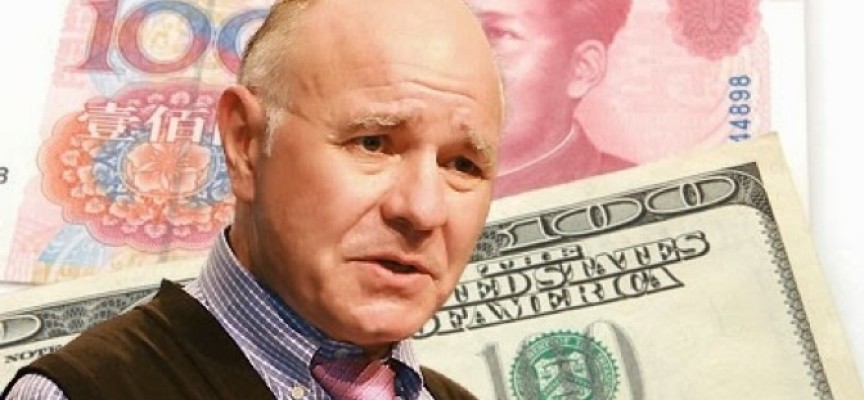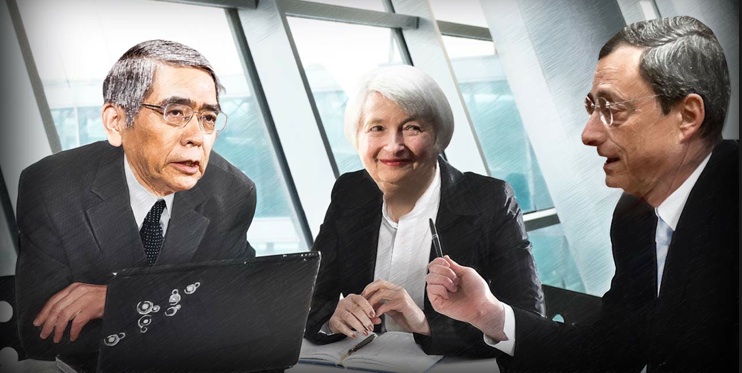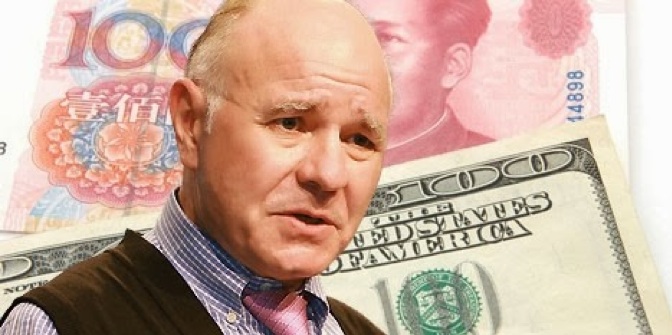Marc Faber – 3 Reasons Why This Global Collapse Will Be Much Worse Than 2008 – 2009
11081 Views September 04, 2015 GOLD, KWN, KWN II King World News

With the Dow falling more than 330 points, today legendary Marc Faber warned King World News that there are 3 reasons why this global collapse will be much worse than 2008 – 2009.
Eric King: “Going back to the 2000 – 2003 unwind, nobody knew that the central planners of the word were going to come in with all this quantitative easing — the insane money printing and these ridiculous policies — but it’s unfolded that way. There was going to be this great cleansing of the system, and part of that has unfolded, but they (central planners) have postponed it repeatedly through these insane monetary policies. Are we at the end of that postponement? Is the day of reckoning finally here?”
Problem 1 – Additional Liquidity Injections Will Have To Be Huge
Marc Faber: “What is interesting in the most recent market decline is that the bond market is not acting particularly well. And additional liquidity injection, first of all, it would have to be huge. Asset purchases by the Fed of $80 billion a month, or say $1 trillion over one year, I don’t think would do the trick to really get the bull market (in stocks) going again….
Continue reading the Marc Faber interview below…
“I think they would need to do much more (than $1 trillion). They will talk to each other and it’s possible they will do more in coordination with Japan, the Bank of England, China, and the ECB.
But you have to understand (LAUGHTER) that we’ve reached a point where currencies have kind of depreciated in concert in real terms. You can buy less assets with (fiat) money today than you could in the 1970s or 1980s.

Eventually this lack of purchasing power, because as you print more and more basically the money loses its value, has a very negative impact on affordability. If you have a department store and you can’t move your merchandise, what would you do? You lower the value of the goods you are selling and you hope to move the excess inventories and get rid of them.
But the Federal Reserve and the other central banks have made goods more expensive for people. So they have even less chance to buy than before. And this is one of the economic problems.

The 2nd Problem
The second problem is while the Fed may be in a position to print money, the ECB and the Bank of Japan are in a very difficult position. Because if Draghi and Kuroda print money, what then happens is the yen goes down and the euro goes down. So in dollar terms global GDP declines. And in dollar terms global trade declines. So actually the more they will print in Japan and Europe, the less likely it is that they will have, globally, a strong economic recovery.
The 3rd Problem
And the third factor I’d like to mention is this: When China really began to grow strongly in the late 1990s, the Chinese economy expanded at that time in somewhere between 8 – 12 percent in real terms — inflation-adjusted. Foreign-direct investments, capital spending, industrial production went up strongly, and incomes went up strongly. And to satisfy all of these factors China needed to import industrial commodities.
So the Chinese demand drove industrial commodity prices higher around the world. This was a very welcome change for the industrial commodity producers from Latin America, Africa, central Asia, the Middle East, Australia, and Russia. So these countries became rich or more prosperous and they bough goods — capital goods and consumer goods — from China, but also from all over the world.
The catalyst was the rise of China and it went to emerging economies, and it then ricocheted into the advanced economies that sold them goods. Now you have Chinese demand going down or no longer growing, commodity prices are falling, what happens to a country like Brazil? They have commodity prices, falling retail sales, a GDP contraction and a very significant industrial production contraction. It’s the same in Canada.

Money Printing Will No Longer Help
So these countries buy less from China, but they also buy less from Europe, the United States, and other countries. And so you essentially have a cycle on the downside that is self-reinforcing. And I’m not sure that money printing will help in this situation — actually it could make matters much worse.”
Eric King: “What you are describing there is the central planners hitting the wall, Marc. Where do we go from here? Does that mean that the great cleansing is now in front of us, where we have that day of reckoning, and how bad will that be?”
Marc Faber: “I would imagine, given the contraction in foreign-exchange reserves around the world, the contraction in China, the fall in commodity prices, and the very elevated debt levels that hardly anyone speaks about in the mainstream media — the fact is that global debts as a percentage of global GDP are now 30 percent higher than they were in 2007 (LAUGHTER), and we know what happened in 2007 (global collapse).
http://kingworldnews.com/marc-faber-3-reasons-why-this-global-collapse-will-be-much-worse-than-2008-2009/
11081 Views September 04, 2015 GOLD, KWN, KWN II King World News

With the Dow falling more than 330 points, today legendary Marc Faber warned King World News that there are 3 reasons why this global collapse will be much worse than 2008 – 2009.
Eric King: “Going back to the 2000 – 2003 unwind, nobody knew that the central planners of the word were going to come in with all this quantitative easing — the insane money printing and these ridiculous policies — but it’s unfolded that way. There was going to be this great cleansing of the system, and part of that has unfolded, but they (central planners) have postponed it repeatedly through these insane monetary policies. Are we at the end of that postponement? Is the day of reckoning finally here?”
Problem 1 – Additional Liquidity Injections Will Have To Be Huge
Marc Faber: “What is interesting in the most recent market decline is that the bond market is not acting particularly well. And additional liquidity injection, first of all, it would have to be huge. Asset purchases by the Fed of $80 billion a month, or say $1 trillion over one year, I don’t think would do the trick to really get the bull market (in stocks) going again….
To hear which company Eric Sprott, James Turk and George Soros invested in that is advancing the digital payments revolution and makes it possible for you to
spend gold with a prepaid-card globally click on the logo:
spend gold with a prepaid-card globally click on the logo:
Continue reading the Marc Faber interview below…
“I think they would need to do much more (than $1 trillion). They will talk to each other and it’s possible they will do more in coordination with Japan, the Bank of England, China, and the ECB.
But you have to understand (LAUGHTER) that we’ve reached a point where currencies have kind of depreciated in concert in real terms. You can buy less assets with (fiat) money today than you could in the 1970s or 1980s.

Eventually this lack of purchasing power, because as you print more and more basically the money loses its value, has a very negative impact on affordability. If you have a department store and you can’t move your merchandise, what would you do? You lower the value of the goods you are selling and you hope to move the excess inventories and get rid of them.
But the Federal Reserve and the other central banks have made goods more expensive for people. So they have even less chance to buy than before. And this is one of the economic problems.

The 2nd Problem
The second problem is while the Fed may be in a position to print money, the ECB and the Bank of Japan are in a very difficult position. Because if Draghi and Kuroda print money, what then happens is the yen goes down and the euro goes down. So in dollar terms global GDP declines. And in dollar terms global trade declines. So actually the more they will print in Japan and Europe, the less likely it is that they will have, globally, a strong economic recovery.
The 3rd Problem
And the third factor I’d like to mention is this: When China really began to grow strongly in the late 1990s, the Chinese economy expanded at that time in somewhere between 8 – 12 percent in real terms — inflation-adjusted. Foreign-direct investments, capital spending, industrial production went up strongly, and incomes went up strongly. And to satisfy all of these factors China needed to import industrial commodities.
So the Chinese demand drove industrial commodity prices higher around the world. This was a very welcome change for the industrial commodity producers from Latin America, Africa, central Asia, the Middle East, Australia, and Russia. So these countries became rich or more prosperous and they bough goods — capital goods and consumer goods — from China, but also from all over the world.
The catalyst was the rise of China and it went to emerging economies, and it then ricocheted into the advanced economies that sold them goods. Now you have Chinese demand going down or no longer growing, commodity prices are falling, what happens to a country like Brazil? They have commodity prices, falling retail sales, a GDP contraction and a very significant industrial production contraction. It’s the same in Canada.

Money Printing Will No Longer Help
So these countries buy less from China, but they also buy less from Europe, the United States, and other countries. And so you essentially have a cycle on the downside that is self-reinforcing. And I’m not sure that money printing will help in this situation — actually it could make matters much worse.”
Eric King: “What you are describing there is the central planners hitting the wall, Marc. Where do we go from here? Does that mean that the great cleansing is now in front of us, where we have that day of reckoning, and how bad will that be?”
Marc Faber: “I would imagine, given the contraction in foreign-exchange reserves around the world, the contraction in China, the fall in commodity prices, and the very elevated debt levels that hardly anyone speaks about in the mainstream media — the fact is that global debts as a percentage of global GDP are now 30 percent higher than they were in 2007 (LAUGHTER), and we know what happened in 2007 (global collapse).
http://kingworldnews.com/marc-faber-3-reasons-why-this-global-collapse-will-be-much-worse-than-2008-2009/





» MM&C 11/14/24 Central Bank Governor Urges Türkiye to Open Accounts for Iraqi Banks
» utube 11/13/24 MM&C MM&C News-Private Sector- Electronic Payments-Reconstruction-Development-Digit
» utube 11/11/24 MM&C News Reporting-IRAQ-USA-Financial Inclusion up 48%-Money Inside & Out of Iraq
» Al-Mandlawi to the UN envoy: The supreme authority diagnosed the problems and provided solutions for
» Saleh: Government strategy to boost gold reserves as part of asset diversification
» Prime Minister's advisor rules out oil price collapse: Trump's policy will not sacrifice petrodollar
» Tripartite alliance between Iraq, Egypt and Jordan to boost maritime trade
» Parliamentary Committee reveals date of entry into force of Personal Status Law
» Al-Fatah warns against US blackmail and Trump's intentions for the next stage
» A leader in the law: If the Americans do not leave on their own two feet, we will expel them in fune
» MP: Next Sunday's session will witness the passing of "important laws"
» There is a financial aspect.. Al-Zaidi rules out voting on the real estate law
» "Promising" economic opportunities in central Iraq open doors to investment, trade and unemployment
» Minister of Transport: Arab interest in the development road project
» Bitcoin Fails to Maintain Its Meteoric Rise
» Amending the retirement age on the parliament's table.. This is the latest that has been reached
» Launching the Health Unit Initiative in Iraqi Schools
» Will Iraq be the savior of the countries of the region if oil prices fall?
» Regarding electrical energy.. Government moves to meet the needs of next summer
» {Retirement age} sparks debate in parliament
» Minister of Transport to {Sabah}: Arab interest in the development road project
» Planning: Two important pre-census activities start today and tomorrow
» Next week.. contracting with 2500 applicants on a {contract} basis
» Service Effort: Opening 30 projects in agricultural areas next month
» The House of Representatives issues a clarification regarding its tenders and official invitations
» Issuance of (3000) new decisions for politically dismissed employees and non-employees
» Al-Sudani discusses cooperation in the field of energy and development of the oil and gas sector wit
» Trade: Transferring 400 billion dinars to pay farmers’ dues for the remaining wheat for the northern
» Iranian Minister of Trade and Industry Injured During Trip to Kurdistan
» Chairman of the Integrity Commission: Corruption negatively affects reconstruction and development a
» Strengthening judicial cooperation on the table of Judge Zidane and his Turkish counterpart
» Al-Sudani directs the Ministry of Oil to communicate with Shell to implement projects that serve Ira
» One of them is "protocol".. A politician determines the extent of the difference between Al-Sudani's
» Iraq confirms its keenness to support OPEC unity to ensure oil price stability
» It may drop to 40%.. Al-Kanani warns of a sharp drop in oil and directs an urgent call to the govern
» Distribution next week.. The region will receive nearly 533 billion dinars to finance its employees’
» Iraq expresses interest in cooperating with major international oil companies
» Criticism follows the performance of the Minister of Foreign Affairs in international positions.. Wi
» Al-Mashhadani's election "embarrassed him"... Will Al-Sudani implement the ministerial reshuffle?
» Will the "dollar crisis" topple the central bank governor?
» The Oil and Gas Law Returns to the Forefront... Will Al-Sudani Be Able to Resolve the Disputes Over
» Oil Licenses in Basra: An Environmental Disaster That Raises Cancer Rates and Suffocates the Populat
» Iraq begins intensive campaign to deport illegal foreign workers and regulate the labor market
» Government advisor explains Baghdad Metro project specifications and confirms its continuation witho
» Al-Mashhadani to the 188 Alliance delegation: The best solution is to give people the freedom to cho
» Parliamentarian: Ambassadors and representatives of foreign missions came to Parliament to prevent t
» Al-Sudani's advisor reveals the reasons for the lack of gold in the government's reserves
» New fortifications close the most dangerous border gaps between Iraq and Syria
» "Baghdad breathes a sigh of relief" .. Closing of 144 illegal factories that emit toxins into the ai
» Iraqi oil prices continue to decline amid global price decline
» “The War of Leaks” Confuses the Political Scene... Blackmail or Expose of Corruption?
» Government sends budget amendment to resolve differences with region
» More than 800 “dual-job” employees work at Najaf Airport
» Slight rise in dollar prices against the dinar in Iraqi stock exchanges
» Where did the parliamentary discussions on the "retirement age" reach?
» The region "mobilizes" for the first census in 37 years: It will increase the budget share and the n
» "Thousands of them are suspended" .. Draft laws challenge the remainder of the life of the current p
» Population, oil and salaries...hot files in the meeting between Al-Sudani and Barzani
» Political attempts to obstruct it.. Personal Status Law on its way to legislation
» MP: Al-Sudani has reached the conviction of the necessity of removing some ministers
» Central Bank announces progress in dollar control procedures
» Baghdad.. Closing 144 informal metal smelting factories to reduce pollution
» Private Banks Association: Iraq to adopt advanced trade finance system by end of 2024
» Severe imprisonment for former Minister of Transport for deliberately violating his job duties
» 4 new pharmaceutical factories
» Iraq's move to attract $250 billion in investments welcomed
» Financial inclusion and banking restructuring
» Iraq records 4% economic growth, moves towards sustainable diversification
» Al-Sudani and Barzani discuss finding solutions to common issues "according to the constitution"
» Requesting Iraqi mediation.. US delegation arrives in Baghdad to follow up on the "hotline" with Teh
» Iraqi oil continues to decline for the third day in a row
» Population census in Iraq: social and political importance and a major challenge for the government
» Next Thursday.. the start of the first phase of the census
» 11 international companies compete to operate Faw Port
» Baghdad conveys Trump's message to Tehran: Stop proxy wars... and confirms removing the opposition f
» Iraq contracts to purchase defense systems and helicopters
» Has Al-Sudani's government succeeded in keeping the fire away from Iraq?
» Justice announces the Ministry of Finance’s approval to appoint contract employees in all judicial d
» Expert: Traders’ dealings with sanctioned markets trigger demand for dollars on the black market
» Anbar.. Al-Waleed District summarizes the completed and under-construction projects for the current
» A government delegation reviews the work stages and completion rates at Nasiriyah International Airp
» Al-Mashhadani to the Sovereignty Bloc delegation: The necessity of turning the page on differences b
» Al-Hasnawi: Iraq will benefit from green climate funds to improve the environment
» New decisions approved by the Council of Ministers during today's session
» The Chairman of the Trade Bank of Iraq reveals to Alsumaria the interest rate on loans
» The 10 cheapest countries to pay electricity and gas bills.. Where is Iraq?
» Al-Sudani and Nechirvan Barzani at one table in Erbil
» Here are the dollar prices in the Iraqi stock exchanges
» Parliamentary Committee Reveals to Alsumaria Latest Developments in Israeli Violation of Iraqi Airsp
» The largest of its kind in Iraq.. Launching a pioneering medical conference for professional develop
» A source explains the circumstances of transferring 75% of the Ministry of Interior’s civilian emplo
» Weapons are becoming more "loose" and the Interior Ministry is "politicizing"
» Government messages to citizens regarding the population census in Iraq
» What is Iraq's ranking in the Artificial Intelligence Index?
» utube 11/9/2 MM&C News Reporting-Sudani Art IV IMF-Port Faw Open-CBI Governor-No Room for Tw
» Finance Committee discusses revenue enhancement and investment budget allocations with governors
» His advisor: Al-Sudani's visit to Kurdistan focuses on these files
» Al-Tamimi explains the importance of the real estate return law